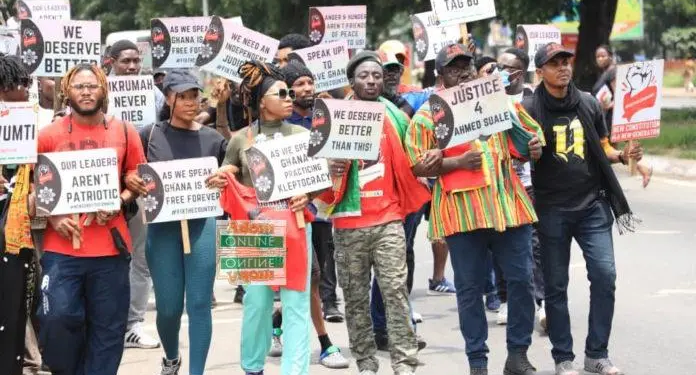Introduction
High living costs, deficiencies in governance, corruption, greed, mismanagement of funds, social injustice, and abuse of power have long been major problems in Africa. Recently, demonstrations and protests organised by young people and youth activists have spread like wildfire across several African countries. The youth of African countries such as Kenya, Uganda, and Nigeria have taken to the streets to voice dissatisfaction with government economic policies.
While governments aim to improve the lives of their citizens through effective policy implementation, they often fall short. It is not surprising to see citizens of countries like Kenya, Uganda, and Nigeria holding demonstrations to communicate their grievances.
In Kenya, the protests were fuelled by controversial tax hikes and demands for government accountability, leading President William Ruto to retract planned tax increases. Uganda also saw online-organised protests against corruption and poor governance. Meanwhile, rising prices of goods have made life increasingly unbearable for the average citizen.
In Nigeria, Africa’s most populous country, a 10-day protest under the hashtag #EndbadgovernanceinNigeria erupted over soaring inflation, economic instability, and the devaluation of the naira following several reforms by President Bola Ahmed Tinubu. These reforms, aimed at reviving the economy, have pushed inflation to 34.19% as of June, with food inflation exceeding 40%.
The reforms include the removal of fuel subsidies, currency devaluation, increased taxes, a cashless economy policy, and the introduction of new currency notes. Protesters have presented a list of 19 demands, including the reinstatement of subsidies on petroleum products.
The African Protest Landscape
Kenya, Uganda, and Nigeria are not the first African countries to see protests against their governments; such actions have long been a common occurrence in the region. A political analyst focusing on West Africa, Chris Ogunmodede, has recounted several instances where African countries have resorted to protests. In 2019, Algerian protesters marched for months under the Hirak movement after President Abdelaziz Bouteflika sought a fifth term. In Burkina Faso, the “La Balai Citoyen” movement ousted Dictator Blaise Compaoré in 2014. Sudan’s Omar al-Bashir was overthrown in 2019 after months of street protests. More recently, in May, police in Benin tear-gassed demonstrators demanding lower living costs, while Angola has seen ongoing cost-of-living protests since 2023, with several arrests.
These examples illustrate that protests are not new to Africa; they have been a consistent way for citizens to communicate with their governments. However, these actions have significant implications for the safety and security of the nations involved.
Security Implications
One of the primary security risks during protests is the potential for terrorist group infiltration. Protests may not only consist of citizens with genuine grievances but also attract individuals with ulterior motives who exploit the situation for their agendas. Nigeria, which has long been vulnerable to terrorism, becomes even more exposed to threats during protests. According to Dele Momodu, a renowned journalist and writer, no part of Nigeria is entirely safe. Insecurity remains a key driver of social unrest in Nigeria, with all regions facing different types of threats.
The North East has been under siege by Boko Haram for over a decade, while the North Central region deals with violent clashes between farmers and herders. In the South-South, militancy is a persistent issue, while the South East and South West face agitation from secessionist groups. Continued protests increase the risk of terrorist infiltration, exacerbating the already challenging security situation.
Another security implication of protests in Nigeria is the rise in crime and the destruction of property and lives. Protests, which are intended to be peaceful, often devolve into violence, leading to the destruction of public infrastructure and private property, theft, armed robbery, and loss of life. During the recent Nigerian protests, both public and private properties were looted and destroyed. According to TVC News Nigeria, at least 22 protesters were killed, mostly in northern Nigeria. There are still memories of the #EndSARS protests of 2020, during which at least 103 people lost their lives. Such events indicate that protests are rarely free from violence and destruction. The government often bears the cost of rebuilding, which can lead to financial losses and economic crises. Nigeria’s Minister of Industry, Trade, and Investment, Doris Nkiruka, reported that the country lost about $325 million per day during the protests.
Such destruction disrupts daily life, increases tensions, and can lead to bitterness and retaliation, further threatening national security.
Economic Implications
Protests and insecurity also have ripple effects on the nation’s economy. During periods of unrest, both local and foreign businesses may be unable to operate, and investors may lose confidence in the country. A country without sound economic strategies for its citizens may end up with high rates of unemployment and poverty.
Conclusion
Protests and their related issues will continue in Africa if they are not given urgent attention. There is a cause to every action, and these protests are no exception. To prevent protests and their associated problems, governments must take decisive actions that create long-term change. One approach is to implement policy and economic reforms and to strengthen security measures to foster strategic and systematic growth.
Corruption and inefficiency are rampant in many institutions, leading to public mistrust of services. Without proper reforms to foster change, stability, and development, Nigeria and other African countries will remain stagnant. Governments must make deliberate efforts to prioritize the socio-economic needs of their people. By initiating meaningful dialogue with citizens, African governments can potentially prevent future protests.






























